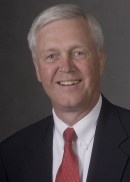Christopher Atchison, Director of the State Hygienic Laboratory (SHL) at the University of Iowa, has announced plans to retire June 30 after serving the state of Iowa and the University of Iowa in that role for a decade.

University of Iowa Vice President for Research and Economic Development Dan Reed praised Atchison for leading SHL, which has been at the forefront of public health issues in Iowa since its establishment in 1904.
Located in the UI Research Park, SHL reports to the Office of Research and Economic Development.
“With his retirement, Chris will bring to a close a remarkable 32-year career in public health—and 45-year career in public affairs—marked by many accomplishments,” Reed said. “Under his guidance since 2006, the SHL has been an enormous public health asset to the local community, the state of Iowa, the region, and beyond. He and the lab played a critical role in responding to the flooding of 2008, the influenza pandemic in 2009, and the threat of Ebola and Zika in 2014 and 2016, as well as many other health and environmental safety challenges in between.”
Reed said Atchison also oversaw the opening in 2010 of a new, LEED-Gold certified building for the SHL in the UI Research Park, boasting the largest open laboratory in the country.
“I’m grateful for Chris’ many contributions to the lab, to the University of Iowa, and to the state,” Reed said. “I especially want to thank him for his friendship and his wise counsel on health policy and wish him all the best in retirement.”
Reed said a search committee will be named soon to begin seeking a new director, a process he hopes will conclude before Atchison steps down at the end of the fiscal year.
College of Public Health Dean Sue Curry also lauded Atchison's work.
"On behalf of the College of Public Health, I want to express my deep appreciation and gratitude to Chris for the critical role he played establishing the college nearly two decades ago," Curry said. "His knowledge, understanding, and extensive personal network within the state and national public health community have made him an invaluable member of our college's leadership team, and helped ensure our program's continued focus and dedication to public health practice and effective health policy."
Prior to joining the faculty at the University of Iowa in 1999, Atchison was Director of the Iowa Department of Public Health (1991-1999) and Assistant Director of the Illinois Department Health 1987-1991.
Atchison has also led a number of state and national boards, including the Iowa Prevention of Disabilities Policy Council, the Safety Net Collaborative Advisory Council, and the Association of State and Territorial Health Officials. He is currently on the Executive Committee and Secretary/Treasurer of the Association of Public Health Laboratories, on the Executive Committee for the National Academy of State Health Policy and is on the Program Integration Committee for the American Heart Association. He has been recognized for his work, as recipient of the University of Iowa’s College of Public Health Board of Advisors Award for Faculty Achievement in Community Engagement, the Association of State and Territorial Officials (ASTHO) Arthur T. McCormack Award, the Iowa Medical Society’s John F. Sanford Award and in 2016, he received the Iowa Public Health Association’s Henry Albert Memorial Award for his contributions to public health practice.
“It’s been an honor to have been entrusted with this role of leadership and for the support Vice President Reed, Dean Curry, and other university administrators have provided,” Atchison said. “I greatly value the opportunity to work with the dedicated staff of the SHL who literally are prepared to work 24/7 to protect the health of Iowans. I look forward to doing all I can to support the State Hygienic Lab and the university during this period of transition.”